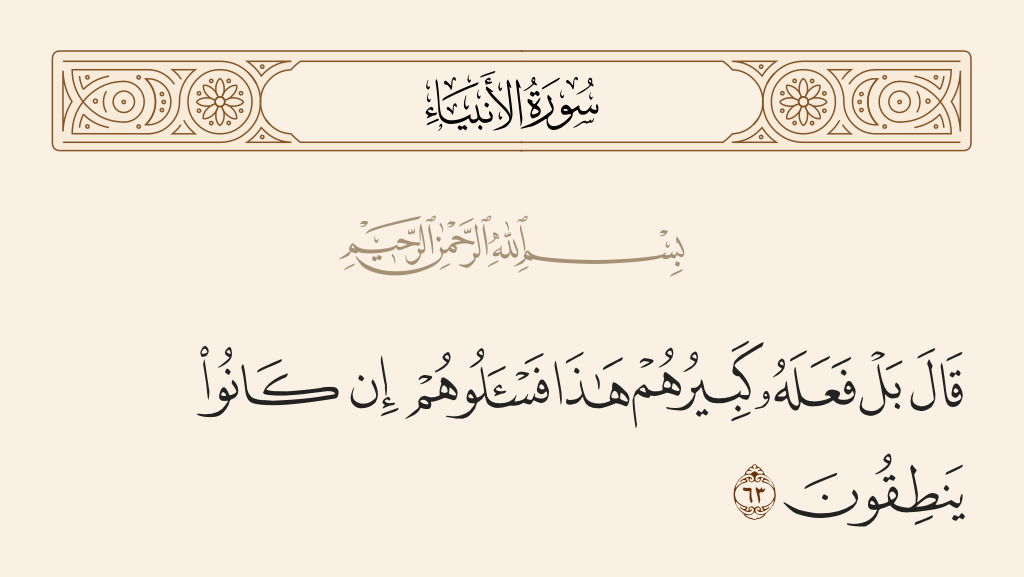Surat Al-Anbiya’ Verse No. 63: Reading and listening
Translation of the verse 63 from Surah Al-Anbiya’ : Number of verses 112 - - page 327 - Part 17.

﴾قَالَ بَلۡ فَعَلَهُۥ كَبِيرُهُمۡ هَٰذَا فَسۡـَٔلُوهُمۡ إِن كَانُواْ يَنطِقُونَ ﴿
[ الأنبياء: 63]
[Ibrahim (Abraham)] said: "Nay, this one, the biggest of them (idols) did it. Ask them, if they can speak!"
English - Sahih International
He said, "Rather, this - the largest of them - did it, so ask them, if they should [be able to] speak."
Tafheem-ul-Quran by Syed Abu-al-A'la Maududi
(21:63) He answered, "Nay, all this has been done by their chief; you may ask them, if they can speak" *60
Tafheem-ul-Quran by Syed Abu-al-A'la Maududi
*60) The very sentence, "You may ask them, if they can speak", is a clear proof that it was not a lie when Prophet Abraham said, "All this has been done by their chief." What he intended by this was to make them realize and confess that their idols were helpless because they could do nothing to protect themselves, and could not even speak. It is clear that when a person poses an unreal question for the sake of argument in order to bring home the fact that the position taken by the other party is untenable, it cannot be considered as a lie; firstly, because the speaker himself never intended it to be a lie, and secondly, because the addressees also knew that it was not a lie.
The foregoing remarks have been necessitated because of a "tradition" that Prophet Abraham told three "lies" in his life, of which one is the abovementioned event. The second "lie" is contained in XXXVII: 89: "I am indisposed", and the third "lie" is not contained in the Qur'an but in the Bible that he declared his wife to be his sister. (Gen. 12:12,13, 18;19). It is a pity that this "tradition" has given rise to two divergent opinions. The orthodox traditionalists actually believe that Prophet Abraham told these lies just because an "authentic tradition" says so. They do not consider that it is far better to discard the "tradition" according to which a Prophet is accused of being a "liar". On the other hand, those who are against the Traditions, discard all of them just because this solitary tradition, which has been reported as authentic by Bukhari and Muslim, is unreliable on the very face of it. Obviously it needs no elaborate arguments to prove that all the traditions cannot be discarded just because one or a few of them are unreliable. As regards the upholders of the first opinion, they have gone to the other extreme and think that a tradition can be discarded in spite of the authenticity of its reporters for cogent reasons. They do this without reference to the contents of the tradition itself. But if the text of the tradition itself clearly shows that such a thing could not have been said by the Holy Prophet, there is no reason to insist that it should be accepted as authentic merely because its reporters are authentic.
This, tradition is unreliable for other reasons also. As has already been shown, the first "lie" is no lie at all. As regards the second "lie", ("I am indisposed"); it cannot be considered as a lie unless it is proved beyond doubt that Prophet Abraham was perfectly healthy at that time, and the text does not testify this. As regards the third "lie", the event stated in the Bible in chapter 12 of Genesis is absurd on the face of it. When Prophet Abraham went to Egypt with his wife Sarah, he was, according to the Bible itself, 75 years old and his wife was 65. Therefore the very age of Sarah is a clear proof that she could not be a "fair woman to look upon" to force Prophet Abraham to pose that she was his sister in order to save his life. The tradition under discussion, which accuses Prophet Abraham to be guilty of telling a lie, has accordingly no basis at all and cannot be taken as reliable in spite of its authentic reporters.